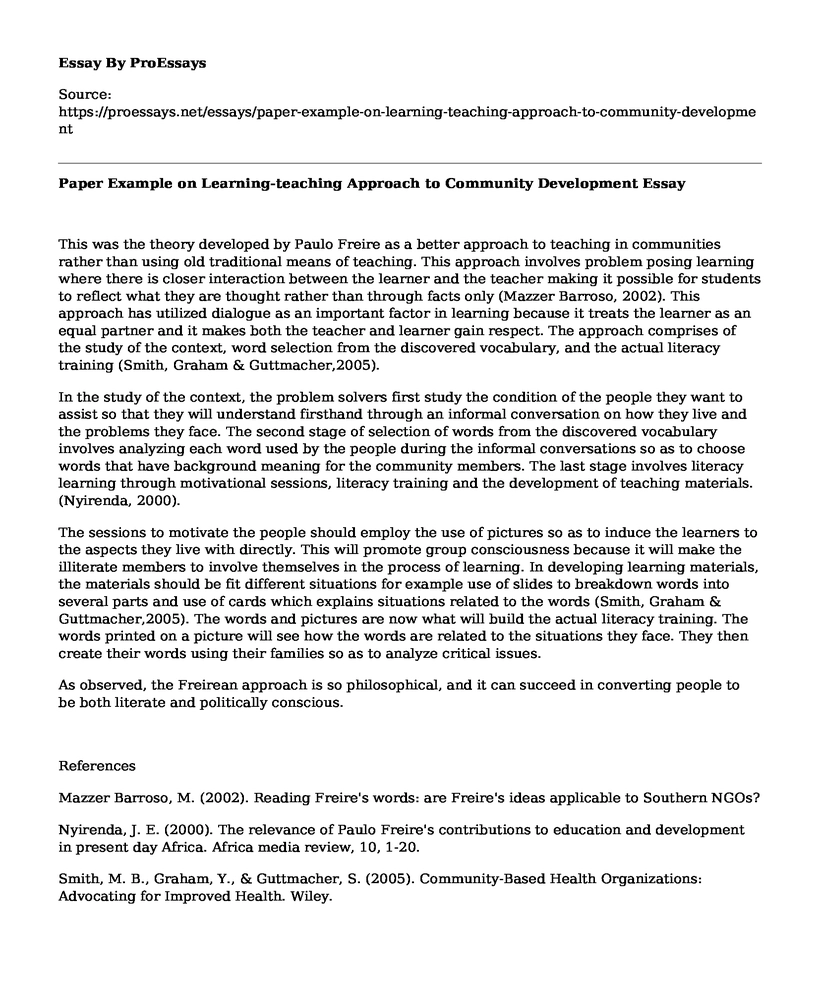This was the theory developed by Paulo Freire as a better approach to teaching in communities rather than using old traditional means of teaching. This approach involves problem posing learning where there is closer interaction between the learner and the teacher making it possible for students to reflect what they are thought rather than through facts only (Mazzer Barroso, 2002). This approach has utilized dialogue as an important factor in learning because it treats the learner as an equal partner and it makes both the teacher and learner gain respect. The approach comprises of the study of the context, word selection from the discovered vocabulary, and the actual literacy training (Smith, Graham & Guttmacher,2005).
In the study of the context, the problem solvers first study the condition of the people they want to assist so that they will understand firsthand through an informal conversation on how they live and the problems they face. The second stage of selection of words from the discovered vocabulary involves analyzing each word used by the people during the informal conversations so as to choose words that have background meaning for the community members. The last stage involves literacy learning through motivational sessions, literacy training and the development of teaching materials. (Nyirenda, 2000).
The sessions to motivate the people should employ the use of pictures so as to induce the learners to the aspects they live with directly. This will promote group consciousness because it will make the illiterate members to involve themselves in the process of learning. In developing learning materials, the materials should be fit different situations for example use of slides to breakdown words into several parts and use of cards which explains situations related to the words (Smith, Graham & Guttmacher,2005). The words and pictures are now what will build the actual literacy training. The words printed on a picture will see how the words are related to the situations they face. They then create their words using their families so as to analyze critical issues.
As observed, the Freirean approach is so philosophical, and it can succeed in converting people to be both literate and politically conscious.
References
Mazzer Barroso, M. (2002). Reading Freire's words: are Freire's ideas applicable to Southern NGOs?
Nyirenda, J. E. (2000). The relevance of Paulo Freire's contributions to education and development in present day Africa. Africa media review, 10, 1-20.
Smith, M. B., Graham, Y., & Guttmacher, S. (2005). Community-Based Health Organizations: Advocating for Improved Health. Wiley.
Cite this page
Paper Example on Learning-teaching Approach to Community Development. (2021, Jun 28). Retrieved from https://proessays.net/essays/paper-example-on-learning-teaching-approach-to-community-development
If you are the original author of this essay and no longer wish to have it published on the ProEssays website, please click below to request its removal:
- Essay Sample on Dishonesty in Present Day Society
- Research Paper on Student Loan Debt: A Growing Crisis
- International Students in Australia: Adjustment & Coping Skills Study - Research Paper
- Article Analysis Essay on The Way We Live Now The War at Home
- Paper Sample on Riley Snorton: Activist, Gender Advocate, Author, and Teacher
- Essay Example on Social Changes in American Society: Frederick Douglass & Sentimentalism
- Paper Example on School Uniforms: Necessity or Unnecessary Inconvenience?







